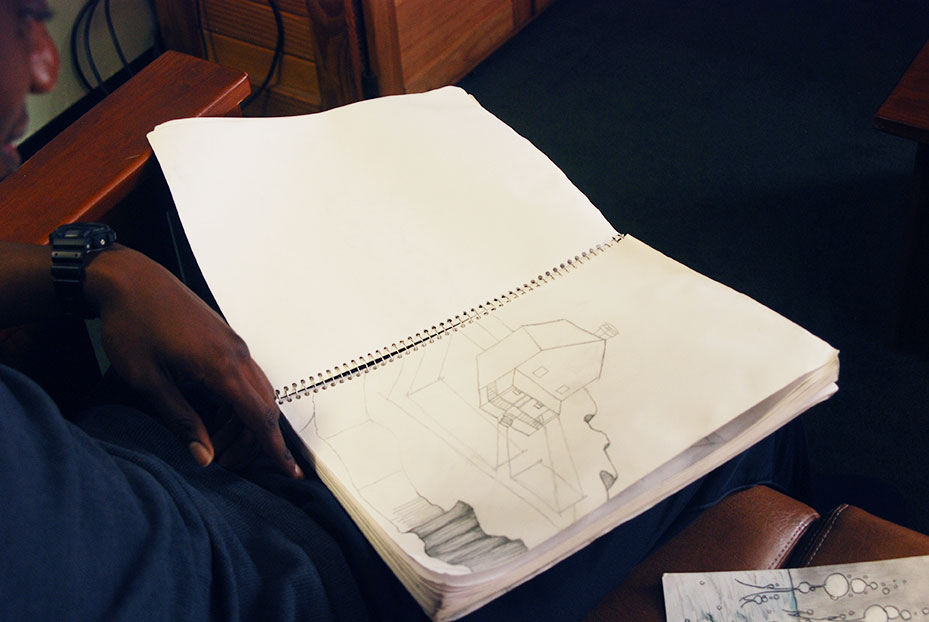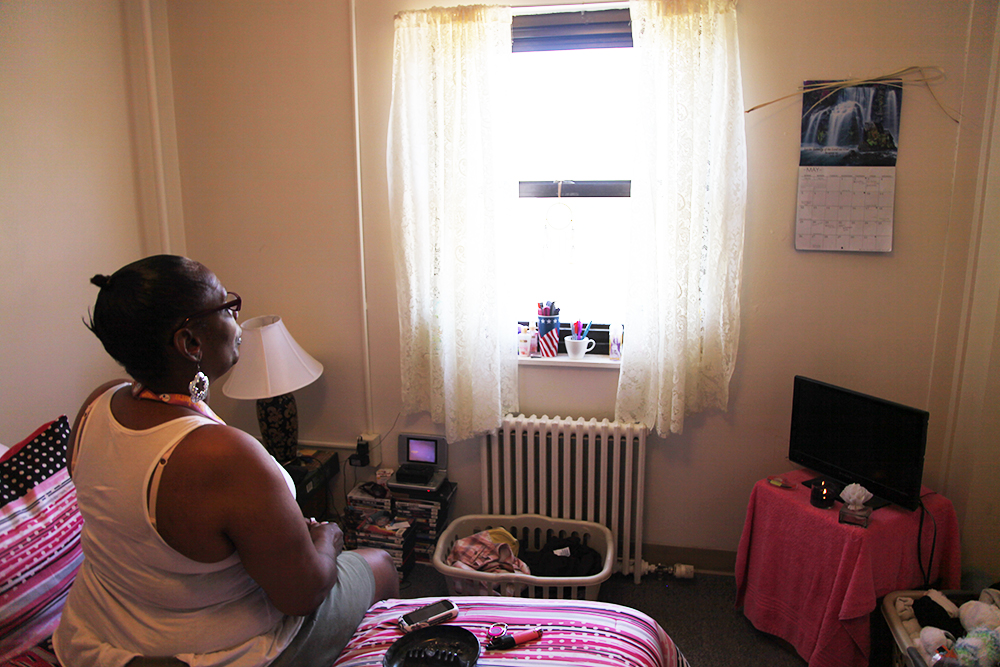Nearly 23,000 people live in limbo as they wait for public housing in Pittsburgh and Allegheny County.
The shortage of low-income housing is so bad that, for the first time in 17 years, Pittsburgh’s city housing authority recently closed the waitlist for the majority of its properties.
Waits for housing through both housing authorities could be years.
Aki Witherspoon and Chris Winston — two 20-year-old men who live in transitional housing provided by the nonprofit Familylinks — hope they’ll be lucky. They submitted their applications just a few days before the Pittsburgh list closed in April.
Winston, a shy man who wants to study art, said he has felt like a ghost since his father died, floating through the homes of relatives who couldn’t afford to let him stay or couldn’t stop arguing.
Asked about a pencil drawing of a house in his sketchbook, he said: “It kind of represents a place where I want to be, but it’s hard to get to.”
Tabitha Ceryak, a case manager at Familylinks, expressed her fears for the two, who will need to leave the 18-month transitional housing program in about a year.
“If they don’t find a home, what am I supposed to do with these kids, push them out on the street?” she asked. Public housing is “so backed up I think it’s completely hopeless.”
The nation is in the midst of a public housing crisis exacerbated by a protracted recession and state and federal funding cuts. Housing authorities throughout the country are wading through long waitlists for public housing.
The District of Columbia’s housing authority, for example, closed its waitlist of 70,000 names in April for the first time, according to the Washington Post. An inspector general’s report called for closing the list after estimating an applicant requesting a one-bedroom apartment could be waiting 28 years, the newspaper reported.
Housing officials in Pittsburgh and Allegheny County said it’s not possible to give estimates of wait times because so much depends on the size and location of housing needed.
And there is no centralized database to compare public housing shortages in other cities in Pennsylvania.
There are two primary types of public-housing programs. Low-income public housing refers to residences local housing authorities manage and provide to low-income families, the elderly or people with disabilities at rents that correspond to income.
The Housing Choice Voucher program, formerly known as Section 8, provides rental subsidies to low-income individuals to rent from private landlords.
About 11,600 people are in the queue for low-income housing through the Allegheny County Housing Authority and the Housing Authority of the City of Pittsburgh.
For the voucher program, more than 11,300 people are on the city and county waitlists, which have been closed for some time.
Nearly 8,000 children are among those on waitlists for both programs.
More than 80 percent of families on the waiting lists have “extremely low incomes,” defined as less than 30 percent of the area’s median, according to the National Low Income Housing Coalition.
Ceryak said one woman who applied for low-income public housing in Pittsburgh three years ago was contacted a few months ago by the housing authority about an opening. The woman had already moved to another state.
Abuse and homelessness

The lack of immediate housing assistance creates desperate situations, said Linda Couch, the coalition’s senior vice president for policy and research.
“This is why you see fires in the winter from people heating (homes with) ovens,” she said. People don’t have enough to pay their bills. “Domestic violence victims continue to stay with their abusers, and obviously the worst situation is people become homeless.”
“There are a lot of people in homeless shelters hoping their number comes up,” said Nan Roman, president of the National Alliance to End Homelessness. “If everybody who was homeless could get housing assistance, homelessness would probably end.”
Yvonne Smith of Pittsburgh is an example of how public housing can help people in dire situations.
A 51-year-old former hotel housekeeper and fast-food worker, Smith lived in at least six shelters and halfway houses over several years. At other times, she roamed among the homes of friends and family. She even stayed in an abusive relationship to keep a roof over her head.
“I stayed with people here and there, from pillar to post,” said Smith, who said she has been sober for nearly three years after decades of addiction to crack and alcohol. Over the years, two of her eight children were taken by state child-protective services and the others grew up with relatives.
“I was tired of living the way I was living,” she said.
After spending nearly two years — the maximum allowed — in a drug recovery program at Bethlehem Haven’s transitional housing in Pittsburgh, she applied for low-income public housing in the city.
Smith was initially denied because she had served probation on a prostitution charge in 2008; she requested a grievance hearing and a hearing officer ruled in her favor.
About six months later, she was told a one-bedroom apartment was available in the Northview Heights building in the North Side.
“I was ecstatic,” she said. “I was so happy I cried.”
The economics of the shortage

The squeeze on public housing has come at the end of a long train of economic problems.
Incomes are stagnant and unemployment remains high, making a pathway out of assistance programs difficult.
People who had purchased homes discovered they couldn’t actually afford them and left for apartments, crowding the rental market and driving up rental costs.
Most public housing programs haven’t expanded, and the national trend of tearing down public housing to build mixed-income developments leaves fewer subsidized units.
State and federal budgets are strapped.
In March, Governor Tom Corbett received a note from HUD Secretary Shaun Donovan warning him of a $37.5 million reduction from fiscal year 2012 for funding for rental assistance, homeless assistance, affordable housing and other programs. The cause was the federal sequestration.
The Allegheny County Housing Authority is on track to lose $1.4 million for the year because of the sequestration, said Executive Director Frank Aggazio. The agency laid off 13 people in March and expects to give rental aid to 300 fewer people this year.
What are the solutions?
Put simply, more money and dedication to fixing the housing problem would be an ideal solution.
However, the economy and politics involved continue to put that remedy out of reach.
“There’s really no good answer to this problem except to just provide more housing assistance to people,” Roman said.
Newer interventions attempt to fill the gap.
Some, called rapid re-housing programs, focus on providing money so a family can stay in their current housing situation rather than being moved out and becoming homeless.
Others provide social workers to help families attain jobs and education and meet their financial goals.

Lois Mufuka Martin, executive director of Bethlehem Haven, said that real change will take a national policy that considers housing a basic right.
“As social workers, we go in and fill gaps,” she said. “We’re not being asked to fill gaps. We’re being asked to be the safety net.”
For now, Liz Hersh of the Housing Alliance of Pennsylvania said she’d be optimistic if President Barack Obama’s budget were adopted, which is not expected, because it would bolster housing authorities and help them reduce wait times.
“Whether waitlists are old or new or big or small, ultimately that’s irrelevant when you’re one of those people living with extreme uncertainty of what are you going to do tomorrow, what will you tell your kids…” she said. “And they are totally solvable problems.”
In her small North Side apartment, Smith proudly displays her Bible, teddy bears and letters from her boyfriend. She cherishes the privacy of her morning ritual, sipping coffee and meditating as the sun shines in her bedroom.
She pays $188 for rent and utilities, about 28 percent of a monthly $660 Social Security disability check.
Smith’s chest puffed up when she shared that one of her daughters had said she was proud of her progress.
“I had to go through a lot of changes to get where I’m at,” she said. “This is my first very own place and I love it because it’s mine. I don’t have much, but that don’t matter.”
Reach Halle Stockton at 412-315-0263 or hstockton@publicsource.org.







